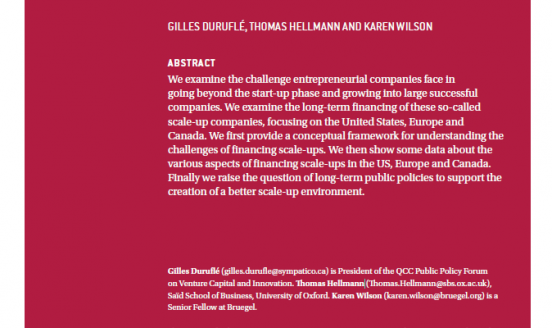10 tips for entrepreneurs looking for equity funding
Access to finance is a key issue for entrepreneurs launching and growing businesses. However, entrepreneurs often have misperceptions about the possib
See also the video interview on equity crowdfunding with Karen Wilson.
Access to finance is a key issue for entrepreneurs launching and growing businesses. However, entrepreneurs often have misperceptions about the possible sources of financing and which might be the most appropriate for their business.
Not all financing is equal – different types of funders have different requirements. While venture capital is often held up as an optimal source of financing, it is only appropriate for a small percentage of firms. Below are some of the key points that entrepreneurs should keep in mind when determining which type of financing would be best for their firm, particularly if they are interested in securing venture capital (VC) or angel investment.
1. Assess your financing options
- If you are looking for venture capital, do you have what VCs seek?
- Excellent but also flexible management team
- Large and/or growing market for your services/products
- Products/services which are unique and scalable
- What are your other financing alternatives?
- Banks: want collateral and demonstrated capacity to pay back
- Angels: often invest based on interest in concept or in helping other entrepreneurs, not just for financial reasons
- Crowdfunding: consider the complications of managing so many small and, in many cases, inexperienced investors
2. Know your business
- What type of company are you planning to create? A “life style” (self-employment) business, a small or medium sized company with little to modest growth potential or a high-growth oriented company? VCs and many angel investors are looking to invest in high-growth companies.
- Which sector is your business in? VCs often prefer technology-based firms such as those in ICT, biotech and cleantech industries. Angel investors consider a broader range of sectors.
- Do you have some unique and protected intellectual property? VCs are attracted to firms with patents on their innovation.
- Is your concept scalable? Investors will want to see potential efficiencies of scale.
3. Size the market
- How big is the potential market? Have you really “qualified” the market (i.e. run the actual numbers, not just estimated potential market share)?
- Do you have a focused business strategy and clear business model for generating revenues?
- Who are the target customers - specifically, not generally? How will you reach them?
- Is your target market local, national or global? VCs and many angel investors are interested in firms with global ambition.
4. Focus on market needs
- Don’t believe that “if you build it, they will come”. Understand the market need that your product will address and how you will deliver to your customers.
- Investors are looking for results, not simply interesting technology or products. Help them understand, in non-technical terms, how your products will meet a customer’s need.
- Test and learn from the market. The internet provides greater opportunities to do so and at early stages of development.
- Secure at least a few key clients to demonstrate client interest (letters of intent, co-development partnership, pilot trial).
- Clearly communicate your firm’s role in the market – positioning, differentiators and competitive advantage.
- Understand who your potential competitors might be and monitor them on an ongoing basis. Yes, you do have competitors – don’t try telling investors what they hear all the time, “we have none”! They will think you haven’t done your homework.
5. Understand your financing needs
- How much money do you need and over what timeframe? Remember it can take a long time to raise equity financing, especially for the first round of funding.
- How much money/how many financing rounds will it take you to get to breakeven? What milestones will you need to meet throughout the process?
- Do you really need outside money now? How much equity will you have to give up?
6. Be realistic
- It always takes 2 to 4 times as long and costs 2 to 4 as much as expected!
- Never take your eye off your cash flow – don’t run out of cash.
- It is better to under-promise and over-perform than the reverse. Don’t oversell your business to investors – often they have seen many companies, including ones like yours, and therefore already have a good idea of what to expect.
7. Remember that all money is not equal
- What additional benefits do you need/want from your financiers?
- VCs often serve as board members and, like angel investors, provide strategic input. They also help with future financing rounds (assuming the company is meeting its milestones).
- VCs and angel investors can also provide valuable links to important networks for your firm’s growth and often help in recruiting senior management or board members.
- Depending on the investor, they may also provide other “hands on” help.
- What restrictions or constraints would not be acceptable for your firm?
- Tight timelines/milestones, unfavorable or strict conditions, etc.
8. If seeking VC, find the right firm
- Most VCs have particular investment areas in which they focus. Save your time and theirs by focusing on those VCs investing in your industry sector.
- Every VC has a different approach to investing and supporting portfolio companies. Some are proactive, others are reactive. Find the VCs that can meet your firm’s needs.
- Get on their radar screen or secure an introduction. VCs are swamped with unsolicited proposals. Most VCs invest either in teams they proactively seek out or in teams who have contacted the VC through a known source.
- Ask other entrepreneurs for references on VCs (how they operate, the relationship with the entrepreneurs, the level of support they provide, etc.) including those from portfolio companies of VCs you are considering approaching.
- Most importantly, find the right personal fit. In securing VC financing, you are initiating on a long-term relationship. The VCs will sit on your board and be in frequent contact. Make sure your goals are aligned at the start and build trust throughout the process.
- Remember that your current VCs are the best potential source of financing for future rounds.
- A complicated deal is usually a bad deal. Don’t be afraid to walk away if the terms become so convoluted that the objectives and incentives are no longer clear.
9. Be open and honest
- Investors want to see that you understand the challenges and risks of your company. Don’t try to hide issues from them – they will only think you have either not identified them yourself or are not trustworthy.
- Listen and learn from the feedback you receive from investors. It can be hard to hear critical comments about your business idea but take advantage of the opportunity to learn and adjust your business model or approach.
- Don’t worry about sharing information about your firm. If you aren’t open, you can’t receive input from investors or the market.
- Stay open and flexible to changes. While you need an initial plan to guide the team, things will never go exactly as expected. Plans will and should shift as the firm evolves and new information is learned about the market.
- Get everything in writing – even if the plans are with your best friend or spouse. Nothing clarifies expectations more than seeing ideas in print. It also helps to avoid any misunderstandings later.
10. Have an exit strategy in mind from the start
- If you are seeking equity investment, you will have to have a strategy for exiting through an IPO or trade sale in the future. What are the company’s alternatives for exiting and how realistic are these for your firm?
- How will your investors (and your team) realize gains on the investment in the company? What type of return can they reasonably expect?
- What steps will you take over time to move towards an exit strategy? Will you be willing to exit?

